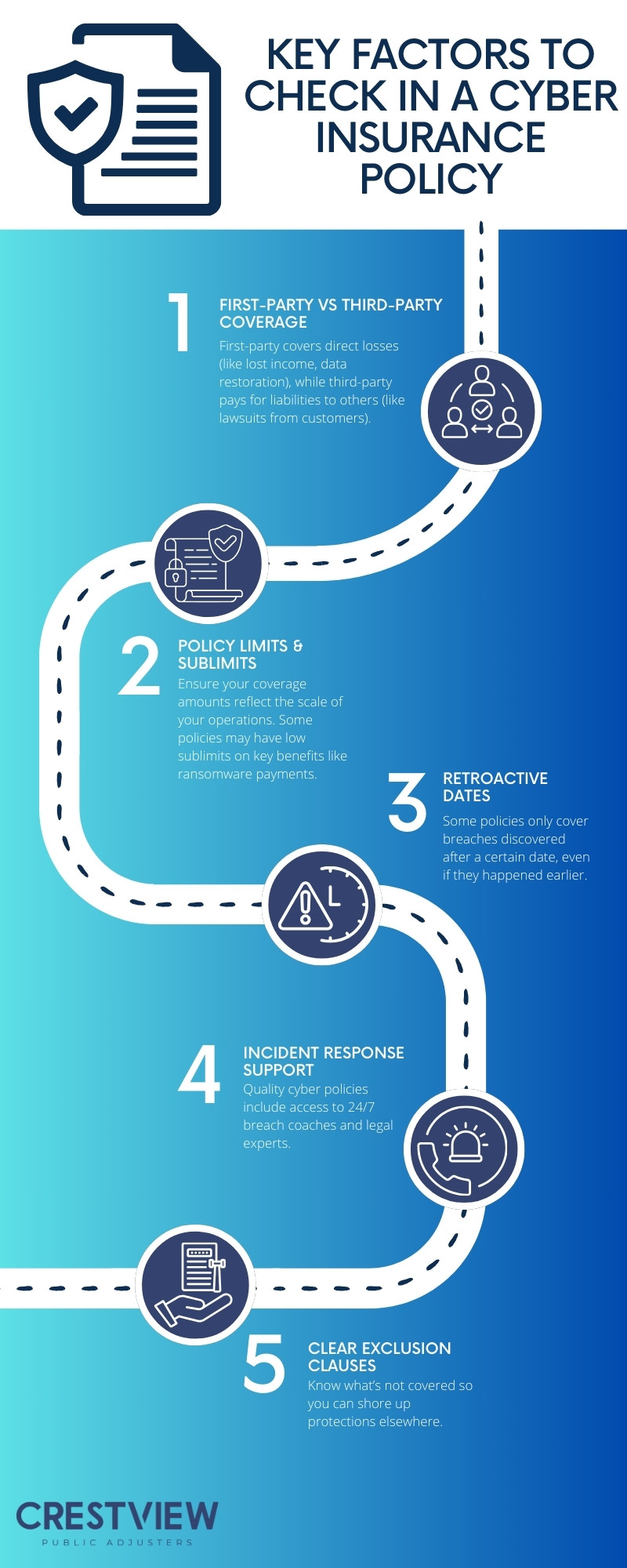Key Points:
- Cyber insurance covers the financial fallout of cyberattacks like ransomware, data breaches, and phishing scams.
- The policy kicks in to pay for business interruption, legal fees, regulatory fines, data recovery, and more—depending on your coverage.
- Public adjusters help policyholders navigate and maximize their cyber insurance claims after an attack.
Cyber insurance works by helping businesses and individuals recover financially from cyberattacks or data breaches. It covers costs like forensic investigations, data restoration, notification to affected individuals, legal fees, and even ransom payments, depending on the policy.
Cyber liability insurance doesn’t prevent attacks, but it transfers the financial risk to the insurer, offering a critical buffer for businesses trying to stay afloat after a digital hit.
Why Cyber Insurance is More Crucial Than Ever
The stakes of a digital breach have never been higher. According to IBM’s 2023 Cost of a Data Breach Report, the average cost of a data breach in the U.S. hit $9.48 million—a financial blow that many small to midsize businesses simply can’t absorb without help. From ransomware attacks paralyzing operations to phishing scams draining accounts, cyber threats are no longer just an IT issue—they’re a business continuity issue.
Cyber insurance is the safety net that helps you recover costs and maintain operations when the worst happens. But while the idea sounds straightforward, understanding how cyber insurance works in real life requires digging into what’s covered, how claims are handled, and what you can do to get the most from your policy.
What Does Cyber Insurance Typically Cover?
Understanding your policy’s scope is essential, because not all cyber insurance is created equal. Coverage can vary significantly between insurers and plans, but a well-rounded policy usually includes:
After a cyberattack, expenses don’t stop at IT recovery. A strong cyber insurance policy typically includes coverage for:
- Data Recovery: Includes restoring lost or compromised data after a breach or system compromise.
- Business Interruption: Covers lost revenue during the downtime caused by a cyber incident.
- Notification Costs: Pays for notifying affected clients or customers, which is often legally required.
- Ransomware Payments: Some policies will cover ransom demands and negotiation services.
- Regulatory Fines & Legal Defense: Helps pay for legal representation and fines tied to data protection laws like GDPR or HIPAA.
- Public Relations & Crisis Management: Assists in managing reputational damage, including hiring a PR firm.
Real-life example? A small e-commerce site hit by a ransomware attack may face website downtime, angry customers, regulatory investigations, and even lawsuits. If they have the right cyber policy, they can file a claim to recover lost income, restore files, and pay for legal counsel—without gutting their business savings.
What Is Not Covered by Cyber Insurance?
Cyber insurance can feel like a financial lifesaver—until you realize it doesn’t cover everything. Insurers have exclusions to avoid footing the bill for negligence or pre-existing vulnerabilities. That’s why understanding your policy’s limits and exclusions is just as important as knowing what it includes.
Typically not covered:
- Known Vulnerabilities: If your systems were outdated or unpatched, the insurer might reject the claim.
- Reputation Loss Alone: Loss of customer trust is hard to quantify and isn’t always reimbursed.
- Future Profits: Policies may cover business interruption during the recovery period but not lost potential earnings after.
- War or Acts of Terrorism: Some insurers exclude state-sponsored cyberattacks.
You can’t skip software updates and expect your cyber policy to act like a magic eraser. Insurers expect you to maintain basic cybersecurity hygiene.

Who Needs Cyber Insurance the Most?
Cyber insurance is not just for tech companies. In fact, any business that handles sensitive customer data or relies on digital systems to operate is a target. And with phishing attacks and ransomware campaigns becoming more sophisticated, no industry is immune.
Here are the sectors that benefit the most:
- Healthcare Providers: Constantly targeted due to the value of patient data.
- Financial Services: Banks, credit unions, and fintechs face relentless attempts to breach accounts and steal PII.
- E-Commerce and Retail: High transaction volumes and customer databases make them attractive to hackers.
- Professional Services: Law firms and accountants deal with confidential information that criminals can monetize.
- Education & Nonprofits: Often lack the IT infrastructure to resist or respond to attacks effectively.
Even if you’re a solopreneur with a single laptop, if you store client information or rely on cloud tools, you’re exposed.
How Are Cyber Insurance Claims Handled?
Filing a cyber insurance claim is not as simple as submitting a form and waiting for reimbursement. It’s a layered process that demands prompt action, accurate documentation, and often outside experts. This is where public adjusters become invaluable.
Here’s how the process typically goes:
- Detection & Incident Response – As soon as an attack is detected, initiate incident response. Insurers usually have hotlines or preferred vendors like forensic experts you must call right away.
- Documentation – You’ll need to document everything—when the attack occurred, how it was discovered, what systems were impacted, and what actions were taken.
- Notification & Regulatory Compliance – If customer data was exposed, you might have to notify affected parties and regulators within tight deadlines. Failing this can jeopardize your claim.
- Working With Adjusters – Insurance companies will assign their own adjuster to assess the claim. However, these adjusters represent the insurer, not you. Hiring a public adjuster means having someone in your corner to maximize your payout and defend your interests.
- Claim Settlement – Once the investigation concludes, you’ll either receive compensation (based on your policy’s terms) or be denied—often citing exclusions or lack of documentation.
What Should You Look for in a Cyber Insurance Policy?
Not all cyber insurance is built alike. The devil is in the details—and those details determine whether you’ll actually receive the help you need in a crisis.

This kind of policy review isn’t easy, which is why many businesses rely on public adjusters to decode and interpret dense insurance language before trouble hits.
How Much Does Cyber Insurance Cost?
The cost of cyber insurance varies based on:
- Size of Business
- Industry
- Type and Volume of Data Held
- Cybersecurity Practices
- Claims History
For small businesses, premiums may range from $500 to $2,000 per year. Larger enterprises with more exposure can expect to pay significantly more—especially if they hold sensitive data or operate in high-risk sectors.
Insurers often give discounts for having solid cybersecurity practices in place, like multi-factor authentication, regular software patching, and employee training.
Cyber Insurance in Real Life: Case Examples
To really grasp how cyber insurance works in real life, let’s look at common real-world applications:
- Case #1: A CPA firm hit by phishing – An employee clicked a malicious email that exposed client financial data. The firm used its cyber policy to hire forensic investigators, notify affected clients, and cover a class-action lawsuit.
- Case #2: Hospital ransomware attack – Systems went down for days, delaying surgeries. The policy covered emergency data recovery, business interruption losses, and regulatory fines.
- Case #3: E-commerce database leak – Customer information was leaked due to a vulnerability in their payment processor. Cyber insurance paid for breach notifications, credit monitoring, and PR crisis management.
These cases highlight why knowing your coverage inside and out matters—long before an attack occurs.
Get Help Navigating Cyber Insurance Claims
If your business has suffered a cyberattack, your insurance claim shouldn’t be another battle. Crestview Public Adjusters specializes in handling cyber insurance claims and ensuring policyholders get what they’re entitled to—not just what the insurer offers.
Whether you’re based in Florida, New Jersey, or New York, we’ll work on your behalf to document losses, challenge denials, and fight for full compensation under your cyber policy.Don’t go through the claim process alone—let Crestview Public Adjusters handle it for you. Contact us today.

